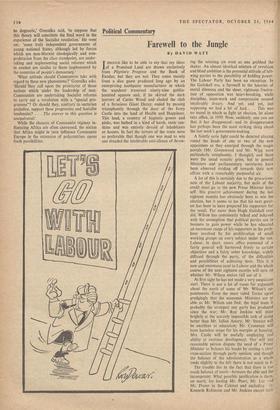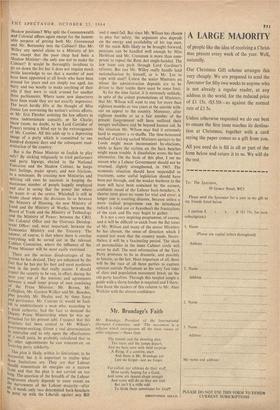Political Commentary
Farewell to the Jungle
By DAVID WATT
ISHOULD like to be able to say that my ideas lof a Promised Land are drawn exclusively from Pilgrim's Progress and the Book of Exodus, but they are not. They come mainly from a dice game produced long ago by an enterprising toothpaste manufacturer in which the wanderer traversed ninety-nine goblin- haunted squares and, if he skirted the dark horrors of Caries Wood and eluded the club of a ferocious Giant Decay, ended by passing triumphantly through the door of the Ivory Castle into the land of Health and Happiness. This land, a country of hygienic greens and pinks, was bathed in a kind of harsh, tonic sun- shine and was entirely devoid of inhabitants or houses. In fact the terrors of the route were so preferable that though one was mad to win one dreaded the intolerable anti-climax of throw-
ing the winning six even as one grabbed the shaker. An almost identical mixture of revulsion and blind ambition is the perennial attitude of left- wing parties to the possibility of holding power. The Labour Party has been no exception. In the Gaitskell era, a farewell to the luxuries of moral dilemma and the sheer, righteous frustra- tion of opposition was heart-breaking, while discipline, team-work and compromise seemed intolerably dreary. And yet, and yet, just supposing we had a bit of luck . . . This was no mood in which to fight an election, let alone take office, in 1959. Now, suddenly, one can see that it has disappeared—and its disappearance has perhaps been the most striking thing about the last week's government-making.
A faintly eerie light could be detected playing round the heads of one or two of the new appointees as they emerged through the magic portals (Mr. Greenwood and Mr. Wigg were particularly ectoplasmic, I thought), and there were the usual ecstatic grins, but in general Ministers and parliamentary secretaries have been observed striding off towards their new offices with a remarkably purposeful air.
A lot of this is certainly due to the precarious- ness of the Labour majority, but racist of the credit must go to the new Prime Minister him- self. His greatest achievement during the last eighteen months has obviously been to win the election, but it seems to me that his next great- est has been to have prepared his supporters for the result. Far more than Hugh Gaitskell ever did, Wilson has consistently talked and behaved with the assumption that political parties are in business to gain power while he has -educated an enormous range of his supporters in the prob- lems involved by his proliferation of small working groups on every subject under the sun.
• Labour, in short, enters office possessed of a fairly general will harnessed firmly to certain objectives and a fairly sober knowledge, widely diffused through the party, of the difficulties and possibilities of achieving them. This is a new and enormous asset to Labour and the whole course of the next eighteen months will turn on whether Mr. Wilson makes full use of it.
At first sight he has not made a very auspicious start. There is not a lot of room for argument about the merit of some of Mr. Wilson's ap- pointments. Even the most rabid Tories agree grudgingly that the economic Ministers are as able as Mr. Wilson can find; the legal team is probably the strongest any party has produced since the war; Mr. Roy Jenkins will shine brightly at the scarcely impossible task of doing better than Mr. Julian Amery; Mr. Stewart will be excellent at education; Mr. Crossman will have harmless scope for his energies at housing; Mrs. Castle will be usefully employing real ability at overseas development. Nor will anY reasonable person dispute the need of a Prime Minister to balance his books by cutting a clear cross-section through party opinion, and though the balance of the administration as a whole tends slightly to the left there is not much in It
The trouble lies in the fact that there is too much balance of merit—between the able and the incompetent. What possible justification is there, on merit, for having Mr. Peart, Mr. Lee nd Mr. Fraser in the Cabinet and excluding Jr. Kenneth Robinson and Mr. Jenkins except their
Shadow positions? Why split the Commonwealth and Colonial offices again except for the lament- able purpose of getting both Mr. Greenwood and Mr. Bottomley into the Cabinet? Has Mr. Willey any special claim to a Ministry of his own except that the poor chap had been a Shadow Minister—the only one not to make the Cabinet? It would be thoroughly invidious to go on down the list but it does not require much inside knowledge to see that a number of men have been appointed at all levels who have been around for years and are simply too aged, too batty and too woolly to make anything of their lobs if they were to stick around for another three parliaments. Where some new departures have been made they are not exactly impressive. The heart hardly lifts at the thought of Miss Jennie Lee overseeing the nation's artistic efforts, or Mr. Eric Fletcher assisting the law officers in some indeterminate capacity, or Sir Charles Snow (soon, no doubt, to be Lord Corridor of Power) turning a blind eye to the extravagances of Mr. Cousins. All this adds up to a depressing Image of a party which is committed to one hundred dynamic days and the subsequent mod- ernisation of the country.
But is the Prime Minister so foolish to play safe? By sticking religiously to tried performers and party bigwigs, elected to the National Executive and the Shadow Cabinet, he keeps hurt feelings, major upsets, and new frictions, to a minimum. By creating new Ministries and Splitting old ones he succeeds in keeping the maximum number of people happily employed and also in seeing that the power lies where he wants it—at the centre. Whitehall is still In doubt about where the divisions lie as between the Ministry of Housing, the new Ministry of Land and the Ministry of Works; between the Board of Trade and the Ministry of Technology and the Ministry of Power; between the CRO, the Colonial Office ahd the Overseas Develop- ment Office; and, most important, between the Economics Ministry and the Treasury. The answer, of course, is that where there is overlap everything will be sorted out in the relevant Cabinet Committee, where the influence of the Prime Minister will be most easily exercised.
These are the serious disadvantages of the system he has devised. They are enhanced by the fact that he has put his best and most moderate men in the posts that really matter. I should expect the country to be run, in effect, during the next year out of the tensions and agreements between a small inner group of men consisting of the Prime Minister, Mr. Brown, Mr. Callaghan, Mr. Gordon Walker and Mr. Bowden, Plus possibly Mr. Healey and, by sheer force and persistence, Mr. Cousins (it would be fool- ish to underestimate a man who, according to a good authority, had the face to demand the beputy Prime Ministership when he was ap- proached for his present job). I suspect that this structure has been central to Mr. Wilson's government-making. Given a real determination to centralise and to rely upon the effectiveness
a small junta, he probably calculated that in nis other appointments he can concentrate on fostering party solidarity.
This plan is likely, within its limitations, to be successful, but it is important to realise what those limitations are. They are that Labour !hould concentrate its energies on a narrow 1,ront and that the plan is not carried on too Icing. The question of the breadth of the Labour Programme clearly depends to some extent on the narrowness of the Labour • majority—after !II, it needs only two determined back-benchers to gang up with the Liberals against any Bill
and it must fail. But since Mr. Wilson has chosen to play for safety, the argument also depends on the energy and availability of his top men. Of the main Bills likely to be brought forward, pensions can be handled well enough by Miss Herbison and Mr. Crossman is more than com- petent to repeal the Rent Act single-handed. The law team can push through Lord Gardiner's reforms. But can Mr. Willey really handle land nationalisation by himself, or is Mr. Lee to cope with steel? Unless the senior Ministers on whom the administration depends are to be driven to their tombs there must be some limit.
As for the time factor, it is extremely unlikely, in spite of the ardent protestations of Ministers, that Mr. Wilson will want to stay for more than eighteen months or two years at the outside with- out an appeal to the country. Moreover, after eighteen months or so a fair number of the present Goxernment will have outlived their meagre usefulness and be beyond human aid. In this situation Mr. Wilson may find it extremely hard to engineer a re-shuffle. The time-honoured method of kicking sacked Ministers upstairs to the Lords might mean inconvenient by-elections, while to leave the victims on the back benches might mean trouble. A dissolution seems the best alternative. On the basis of this plan, I see no reason why a Labour Government should not be returned, slightly strengthened, in 1965. The economic situation should have responded to treatment, some useful legislation should have been put through, and the weaker brethren in the team will have been sustained by the earnest, confident mood of the Labour back-benchers. A shorter term gives no room for trial and error; a longer one is courting disaster, because unless a more radical programme can be introduced (which is ruled out ex hypothest) the frustrations of the rank and file may begin to gather.
It is not a very inspiring programme, of course, and it Will be difficult to catch from the flat tones of Mr. Wilson and many of the senior Ministers he has chosen, the sense of direction which I argued last week that the country needs. Never- theless it will be a fascinating period. The clash of personalities in the inner Cabinet circle will never be dull. The next reformation of the Tory Party promises to be as dramatic, and possibly as lunatic, as the last. Most important of all, there will be the race of all three parties to capture opinion outside Parliament as the very fast tides of class and population movement break up the old party loyalties. Through this tangled jungle a guide with a sharp hatchet is required and I there- fore leave the readers of this column to Mr. Alan Watkins with the utmost confidence.



































 Previous page
Previous page